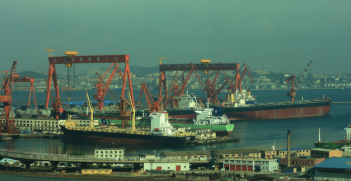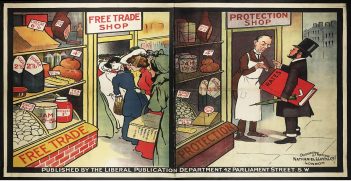The Unlearned Lessons of Trade Wars

Trade wars are not easy to win. In today’s world of complex transnational production structures they are self-destructive. The United States’ trade war with Japan in the 1980s is instructive.
One thing we learn from history is that we don’t learn from history. One might have thought that the big lesson of the Great Depression – that economic crises have an unfortunate habit of morphing into the political variety – would have been indelibly seared into the collective consciousness of policymakers everywhere. Plainly, one would be wrong.
No doubt this is partly attributable to the personal qualities of the current incumbent of the White House. Whatever else Donald Trump may be, it’s uncontroversial to suggest that he’s no student of American history, let alone the rest of the world’s. He’s also surrounded by people who are either loath to contradict him, or who share his world view.
While it may be depressingly easy to make disparaging remarks about Mr Trump’s grasp of international reality – whether it’s the strategic or the economic kind – some of his advisors really ought to know better. It isn’t “easy” to win trade wars, as President Trump asserts. This is true even if the prospective foe is actually a valued ally.
It’s not that long ago that the United States was involved with another Asian nation that was also expected to replace the US as the world’s largest economy. Younger readers may be incredulous to learn that Japan was widely considered the benchmark for national economic competitiveness, not least because it employed “unfair” trade practices that disadvantaged the US.
As with China today, there was some merit in the claims that were made about Japan. It really did borrow technology from the West; it also employed a host of visible and invisible tariff barriers and industry policies to advantage so-called national champions. But there is one striking difference between the Chinese and Japanese cases that makes the dynamics – and the dangers – very different: Japan was a US ally.
When the US decided it had had enough of Japanese “cheating” in the 1980s, it was able to bully its strategic subordinate into changing. Not only was there a now familiar pressure on Japan to liberalise its domestic market, but the US also forced Japanese policymakers to accept a dramatic appreciation of the Yen.
Neither of these moves fixed the trade “problem”, not least because the US didn’t make much that Japanese consumers actually wanted to buy. What it did do, however, was to help fuel a real estate and stock market boom as Japanese policymakers reduced interest rates to remain competitive.
Another often-forgotten historical lesson is that speculative manias generally end in tears. The bursting of Japan’s real estate bubble plunged the once high-flying economy into decades of economic stagnation, not helped by a rapidly shrinking population. Only recently has Japan begun to emerge from its torpor; it may not take much to tip it back into the doldrums or worse.
China has now eclipsed Japan as the second biggest economy in the world and, like other countries in the region, Japan’s economic well-being is increasingly dependent on its sometimes difficult neighbor. China’s leaders would do well do remember Japan’s unfortunate experience in trying to deal with a US-made trade war, as they have many of the same potential vulnerabilities.
Real estate in China already looks overvalued and due for a shakeout. This would expose the domestic financial sector to the same pressures that gripped Japan, with potentially serous problems for economic growth (and not just in China). Whether China’s population would show the same stoicism in the face of a major economic crisis is far less certain. This is, after all, the People’s Republic of China, and it isn’t supposed to suffer crises of capitalism.
China also faces two other questions that Japan didn’t have to confront. First, can Xi Jinping give in to Trump’s demands without a loss of face? Japan was rather used to being in a subordinate position and Japanese prime ministers were usually weak and inconsequential. Xi’s competent strong man image may not leave him much room for manoeuvre.
Second, even if Xi does decide that he needs to appease the US to get the all-important economic relationship back on track, can he actually do so in a way that will satisfy Trump and not wreck China’s domestic economy? His freedom of action may be even more constrained by domestic considerations and the risk of precipitating a national political crisis.
The other point worth considering is whether this time around the damage inflicted on China by a trade war may not be seen as a bad thing by the Trump Administration. Some very respectable figures in America’s foreign policy and scholarly communities have argued that China’s rise is unstoppable so all the US can do is defer the day of reckoning; crimping China’s economic development may be one way of doing that.
Such a calculation of the national interest is hopefully too ill-informed even for the Trump regime, but we live in a world where the unthinkable has become the everyday. So who knows? What we can say with some confidence is that trade wars weren’t effective even when the idea of discrete national economies made some sort of sense.
In a world of complex transnational production structures it is difficult to avoid self-harm by imposing tariffs, not to mention unnerving the perennially skittish financial markets.
Trade wars consequently look self-destructive and unwinnable. Perhaps a respected, trusty and trade-dependent ally should point this out to Mr Trump. After all, he takes our views seriously. Right?
Mark Beeson is Professor of Political Science and International Relations at the University of Western Australia and the AIIA National Research Chair.
This article is published under a Creative Commons Licence and may be republished with attribution.





